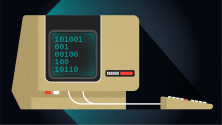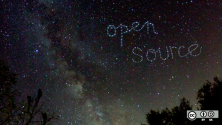I'm beginning to feel old. A few months ago, somebody called me a "gray beard" in a comment in an IRC channel. You might have thought my lack of actual beard and the fact that they used the US spelling, rather than the correct "grey," would have meant that I was unaffected, but no, I was. I've been around for a long time, and I've played with more protocols than are probably good for me, so when I briefly told how I'd started out, and a friend replied, "that story is so good," I realised that maybe my experience differs enough from that of many who've joined the profession more recently than me1 that it might be of interest.
So, here goes. I should preface this account by saying that I was quite a geek at school—and by school, I mean "school," not "university"2—doing basic stick-figure animation, writing Mandelbrot set generators, learning PASCAL and Assembly language, trying to hack the very basic school network, that sort of thing. By the time I went to university in 1990, I'd decided to do something a bit different,5 so I spent two years studying English literature (mainly pre-1840) and another two years studying theology (mainly pre-1640). But I kept up some geekery and had a laptop or PC throughout my time at university. Well, I say laptop, but my first PC-compatible was an 8088 Hitachi luggable with an orange screen. Now, that was a computer.
And I had email. This may not seem like a surprise, but as a humanities6 student in a UK university in the early '90s, it took some doing. In order to get access to email at all, you needed a signed form (it was on yellow paper, I think) from your director of studies and your college computing officer to say you had need of it—and even then you were allowed to send emails only to other people on the UK academic network. And my email address used the standard UK academic addressing scheme: uk.ac.cam.phx@mhb11. Yes, I know this looks backwards. You youngsters: I don't know.
What happened if you sent email to people outside the UK academic address? First time around, they took away all emailing rights for two weeks, and the second time, you were done. No more email for you until the end of the academic year, if I recall correctly. But by the end of my second year, I'd found a Shakespeare-related mailing list based somewhere in the US and convinced my director of studies to lobby for worldwide email access, so I was all set. And when I wasn't looking for people in far-off lands with an email address, I spent lots of time on a local discussion board called GROGGS.
It was on GROGGS that I first posted a message, on Monday, 14 March 1994, under the subject "Inter/Use-net," with the body "Anyone want to show me how to use it…?"
Although the answers took me a while to process, they included a very helpful description of the differences between the internet, FTP, Usenet, Gopher, and the WWW. In retrospect, I particularly like the comment, "You could get it [the web] running at home, but you'd almost certainly want to be running Linux." (The very first reference to Linux on GROGGS was in May 1992.)
As I was getting close to graduating in 1994, I was still unsure what I wanted to do—a teaching qualification in English seemed to beckon—when I came across an interesting job advert at the University Careers Service for an "electronic information controller." Cambridge University Press was looking to use CD-ROMs to release parallel versions of various texts for academic study, quite an innovative idea at the time, and they wanted a junior person with some knowledge of computing to help them out. The job involved computers and literature: what more could I want? I applied.
I got the job, but on one condition: that I successfully managed to get through a six-week paid internship over the summer.
"What will I being doing?" I asked.
"Well, we won't be ready to start on the CD-ROM work till the real job starts in September," they explained, "but we're keen to set up a"—they looked at their notes—"Gopher server. Can you do that?"
"Certainly," I replied, and I had a job.
When I arrived, however, it turned out there was more to it than that. First, they explained that they wanted the Gopher server set up so academic authors could download and submit LaTeX files. The good news was that I wasn't going to need to learn LaTeX. "There is something else, though," said my boss, with a note of some concern.
"Oh," I said, "what's that?"
"The astronomy department keeps going on about something, and if you get the chance and you've finished setting the Gopher server up, would you mind helping them out with it?"
"Um, OK. What is it?"
"It's called HPTP or something like that. Would you mind doing that? They're quite insistent that it's 'the next big thing.'"
And so, after spending approximately a day and a half setting up a Gopher server, I came to be a web admin, running the first web server for a UK publisher and one of the first 20 web servers for any publisher in the world. I jumped through several hoops with DNS authorities, registered the IP address (https://www.cup.cam.ac.uk/), added it to the list of all the web servers running in the world,7 and were we online.
The rest is history. No, that sounds bad and makes me feel really, really old. The rest is for another day: we'll leave it at that for now.
1. This was my attempt not to use the words "older" or "younger."
2. Disambiguate, disambiguate, disambiguate3
3. (Only be sure always to call it "research."4)
4. It's from a Tom Lehrer song: look it up.
5. This decision was aided by various university maths and computing departments failing, quite rightly, to offer me a place.
7. This really existed. There was a page on the web to which you could add your web server address, and people would visit because it was there. No, really.







6 Comments